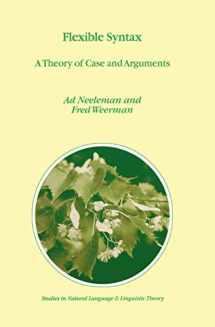
Flexible Syntax: A Theory of Case and Arguments (Studies in Natural Language and Linguistic Theory, 47)
ISBN-13:
9780792371991
ISBN-10:
0792371992
Edition:
1999
Author:
F. Weerman, A. Neeleman
Publication date:
2001
Publisher:
Springer
Format:
Paperback
264 pages
Category:
Grammar
,
Words, Language & Grammar
,
Linguistics
,
Speech
FREE US shipping
Book details
ISBN-13:
9780792371991
ISBN-10:
0792371992
Edition:
1999
Author:
F. Weerman, A. Neeleman
Publication date:
2001
Publisher:
Springer
Format:
Paperback
264 pages
Category:
Grammar
,
Words, Language & Grammar
,
Linguistics
,
Speech
Summary
Flexible Syntax: A Theory of Case and Arguments (Studies in Natural Language and Linguistic Theory, 47) (ISBN-13: 9780792371991 and ISBN-10: 0792371992), written by authors
F. Weerman, A. Neeleman, was published by Springer in 2001.
With an overall rating of 3.6 stars, it's a notable title among other
Grammar
(Words, Language & Grammar , Linguistics, Speech) books. You can easily purchase or rent Flexible Syntax: A Theory of Case and Arguments (Studies in Natural Language and Linguistic Theory, 47) (Paperback) from BooksRun,
along with many other new and used
Grammar
books
and textbooks.
And, if you're looking to sell your copy, our current buyback offer is $0.3.
Description
Most linguistic theories assume that each grammatical relation is established in a unique structural configuration. Neeleman and Weerman take issue with this view, arguing for a more flexible approach on the basis of conceptual considerations and data taken mostly, but not exclusively, from the Germanic languages. In-depth analyses of word order phenomena as well as diachronic and typological generalizations motivate a re-evaluation of the role of case in the projection of arguments. Case is shown to provide a syntactic foothold for thematic interpretation, something which is necessary in a grammar that does not allow fixed theta-positions. Thus, this study does not only offer a genuine alternative to many standard assumptions, it also explains why there should be such a thing as case in natural language.


We would LOVE it if you could help us and other readers by reviewing the book
Book review

Congratulations! We have received your book review.
{user}
{createdAt}
by {truncated_author}


